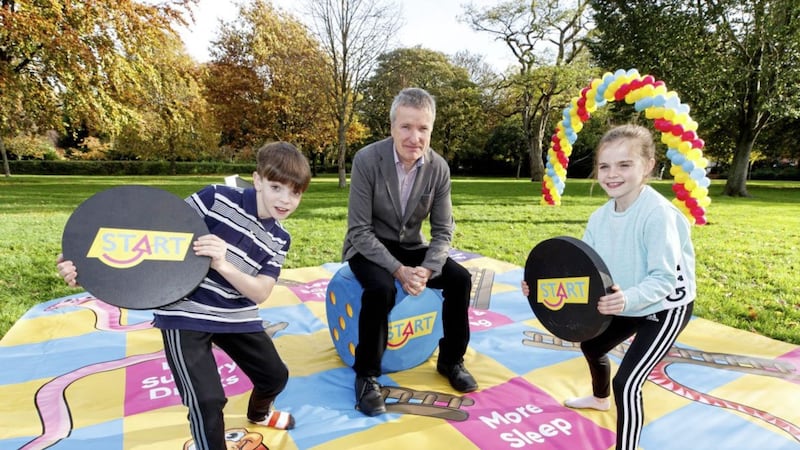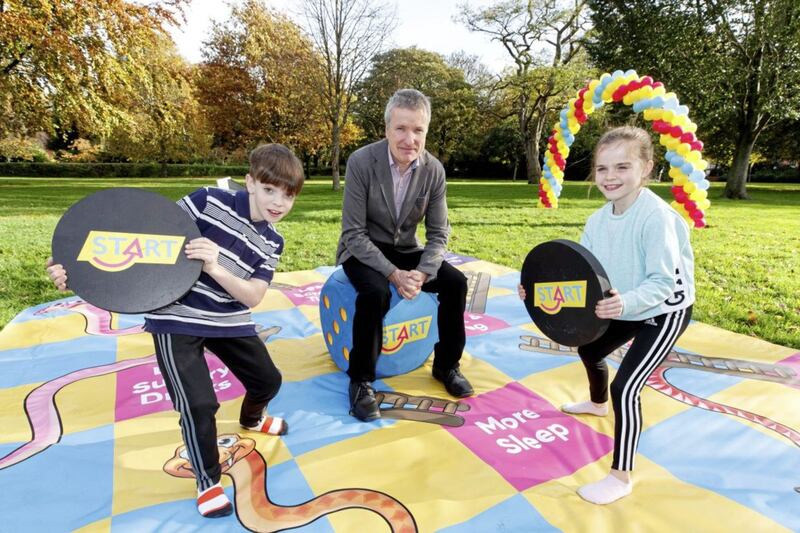WE ALL aspire to giving our kids a healthy start, but here’s the reality: life is busy and parenting is tough. It’s very easy to slip into bad habits and to talk ourselves out of the effort. Instead, how about making one small change at a time and making it stick?
This is the initial approach of Start, a major new five year campaign by the Department of Health, the Public Health Agency and Safefood which aims to support parents by focusing, realistically, on achieving 'one daily win' and building on that.
Small changes achieved daily can have enormous long-term effects. It is much more motivational to make one small change and keep to it than to attempt big changes that are likely to fail.
Even if you don’t keep the habit every day, the fact that you keep it most days means that you are making progress. Here are a few tips to get started.
:: Treats are no longer treats
The real problem is that children have got into the habit of getting so-called 'treats' such as crisps, sugary drinks or biscuits every day – in other words, they are no longer 'treats'.
The first goal is to stop the daily occurrence of food treats in the family. Establish one new rule and make a big difference. For example:
1) Food treats are only given at the weekend or on a 'treat night'
2) No sugary drinks, only water and milk when children are thirsty 3) Always a healthy lunchbox in school.
Having a blanket rule makes things clear and removes the possibility of negotiation.
:: Reduce the size of treats
Young children might get a bar of chocolate, when one square might do, or a full bag of sweets when one sweet would be more than enough. Or, parents might give children an adult portion of dessert when a fraction of this is all they need.
:: Use alternative treats
Try using non-food treats as rewards. Simple items such as stars, stickers and tokens can work just as well as a means of motivating children. Have a treat dip bag at home with things like colouring pencils, rubbers, hairclips, football stickers etc, that you can give out one at a time.
With older children, focus on positive experiences as rewards such as a trip to the park, time playing a game, or reading a special magazine.
:: How to make the change
Involve your children in understanding and making the rules in the first place as well as building good routines and rewards to make them easier to implement.
:: Focus on the good habit you want instead
When eliminating an unhealthy habit, it is much more effective to focus on an attractive good habit you want to create instead. Focusing on the things you don’t want can actually increase your desire for them and make you miserable when they are denied.
:: Prepare children for change and involve them
Include your children in the decision to change to a new habit. For example, you might say "I was thinking we have all got into the habit of too many sweets at home – what do you think?", or "I was thinking that we should have some healthy treats after dinner – which ones would you like?".
Then involve them in making the new healthy habit happen to increase their ownership of it – get their help cutting up fruit for a fruit salad or selecting what outdoor family activity you do at the weekend.
:: Use rewards
When making changes that are hard to sell to children or when the old bad habit appears more attractive to the children, it is useful to introduce temporary rewards.
For example, instead of a treat in the lunchbox, you might agree to give them a small token that they collect daily and which they can cash in for a non-food reward at the end of the week.
:: Saying "No"
Most parents aspire to have healthy eating routines and habits, but there is a big difference between having these aspirations and putting them into practice.
In recent research by Safefood, many parents describe how hard it is to resist the 'pester power' of children. The key is to think through a plan or action for how you will calmly respond.
For example, if your children badger you for sweets when out, you might remind them of a something good if they behave – "when you get home, we can have something nice" or warn them of consequences – "if you keep badgering me, you will only lose some of the treats at home".
Once you learn the skill of saying "no", parenting becomes a lot easier and, believe it or not, children will feel more secure.
And remember, as the new ad campaign says: parenting is tough – but you’re tougher.
:: For more information visit Makeastart.org.



